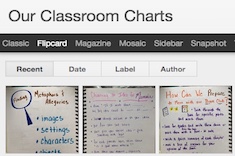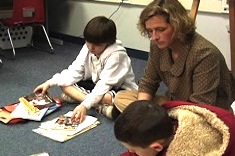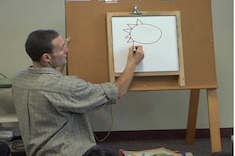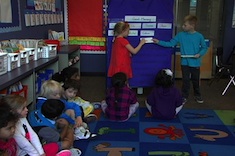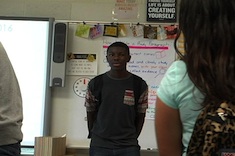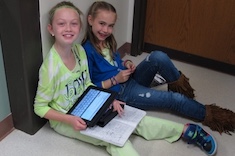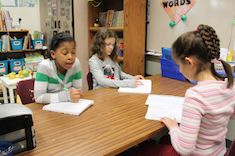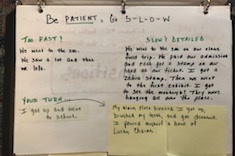Library
Choice Literacy Articles & Videos
The Choice Literacy library contains over 3,000 articles and 900 videos from 150+ contributors. Classic Classroom and Literacy Leadership subscribers have access to the entire library. Content is updated continuously, with five to six new features published each week.
Latest Content
A New System for Anchor Charts
Dana Murphy develops a love-hate relationship with the faded anchor charts peeling away from her classroom walls. She finds a move to anchor charts in a sketchbook and a website for chart images improves the quality of her charts and their usefulness.
August 16, 2019 We Know How
We consider our youngest learners in this week’s newsletter.
The Curious Incident of Poem in the Stream of Time
Shirl McPhillips shares a haunting poem and reflection on creativity, summer’s inspiration, and aging.
Young Learners and Self-Talk
Do you have young readers and writers in your class who constantly talk to themselves? Stella Villalba helps a teacher decode the value of this self-talk for first grader Kayla, using it as a springboard for more learning.
August 9, 2019 Reading the Signs
We look at a favorite tool for teachers in literacy workshops, status of the class, in this week’s newsletter.
Spacing Words: Kindergarten Small Group
Tammy Mulligan uses another kindergartner’s writing as a mentor text for teaching young children how to use spaces in their writing in this demonstration small group.
Drawing and Learning in Kindergarten
Max Brand demonstrates basic drawing strategies early in the year, and then has his kindergartners attempt similar pictures. He explains how the exercise builds basic skills both in literacy and hand/eye coordination.
No Pictures Stinks!
Shari Frost remembers how she inadvertently stifled the creativity of one of her most enthusiastic first-grade writers. Her story has important lessons for all of us about the importance of voice and choice for learners of all ages.
August 2, 2019 Diving into New Roles
We look at how to build classroom communities early in the year in this week’s newsletter.
Student Greeting
Students in the first-grade classroom of Bitsy Parks lead a morning greeting at the start of the day. It’s a quick activity to check attendance, build reading skills, and help students learn the names of classmates in the community.
Status of the Class: Reflecting on Reading Communities
Franki Sibberson uses status of the class each day as a window into her fledgling reading community.
A Better Status of the Class
Dana Murphy finds that adding numbers of pages to her status-of-the-class list for reading makes all the difference in assessing students’ growth and needs as readers.
Linking Literacy and Community at the Start of the Year
Tara Barnett and Kate Mills start with the poem “Where I’m From” to build community through literacy at the start of the year.
Voices Mantra
Christy Rush-Levine’s eighth graders lead their classmates in a “voices” mantra. This shared chant created together starts each class with a sense of community and strength.
July 26, 2019 Death by Banana
We look at reading at home in this week’s newsletter.
July 19, 2019 Data Without Judgment
We look at classroom, coaching, and literacy norms in this week’s newsletter.
Speed Reading
Adolescent learners can face daunting reading loads in high school that they need to tackle at home. Jen Schwanke has tips for how teachers and parents can work together to help teens develop strategies for dealing with a lot of complex reading quickly.
Managing Take-Home Books
Sending books home with young readers is essential. Cathy Mere gives lots of practical tips for designing a take-home books program and communicating with families about what young readers need.
Strategies for Sustaining Student Attention
Jen Schwanke shares some strategies for sustaining student attention beyond just calling out a student’s name over and over and over again.
Forgetting and Remembering
In the end classroom management often comes down to students valuing the same things we do. Jen Schwanke has tips for how high school teachers can create a culture where there is better communication and more shared values.
July 12, 2019 The Most Important Person
We look at the pros and cons of assigning literacy homework in this week’s newsletter.
Setting and Using Classroom Norms
Class promises, rules, and norms—most teachers set them at the start of the year. But how can we make sure students live them? Dana Murphy shares some tips from her fifth-grade classroom.
Homework: I Challenge You!
Heather Fisher helps a first-grade teacher create a homework challenge as a way to make the practice more meaningful and engaging for students and families.
A Homework-Free Classroom
Dana Murphy looks at homework from the twin perspectives of mom and teacher, and finds she hates it from both views.
June 21, 2019 Invitations to Move
We look at how to improve small-group instruction in this week’s newsletter.
Read-Aloud Annotations: Google Slides
In this video series, Franki Sibberson’s fifth graders share their strategies for annotating the class read aloud. In this installment, Antonio shares his Google Slides.
Guided Reading for Proficient Readers?
Shari Frost is surprised to see guided reading used for proficient fifth-grade readers. She considers some strategic alternatives.
Using a Strategy Notebook in Small-Group Instruction
So many needs for groups, and so little time. Dana Murphy finds that a strategy notebook is invaluable as a teaching aid in her fifth-grade small groups.
June 14, 2019 Fly-Fishing on a Basketball Court
We look at talk scaffolds for learners of all ages in this week’s newsletter.
June 7, 2019 Maps and Journeys
We look at student note-taking in this week’s newsletter.
Browse Content By
Type
Category
- Assessment Tools
- Big Fresh Archives
- Booklists
- Choice Numeracy
- Classroom Design
- Common Core
- Community Building
- Conferring
- Content Literacy
- Digital Literacy
- English Language Learners
- Equity
- Family Relations
- Free Samples
- Guiding Groups
- Leadership
- Literacy Coaches
- Mentor Texts
- Minilessons
- New Teacher Mentors
- Podcasts
- Poetry
- Quote Collections
- Reading Strategies
- Self Care
- Struggling and Striving Learners
- Talking and Listening
- Teacher Study Groups
- Teaching Reading
- Teaching Writing
- Word Study and Vocabulary
Author
- Melissa Quimby
- Nawal Qarooni
- Gwen Blumberg
- Julie Cox
- The Lead Learners
- Hannah Tills
- Josie Stewart
- Ruth Metcalfe
- Mallory Messenger
- Becca Burk
- Jodie Bailey
- Vivian Chen
- Mary Brower
- Tiffany Abbott Fuller
- Stephanie Affinito
- Ruth Ayres
- Leigh Anne Eck
- Heather Fisher
- Shari Frost
- Julie Johnson
- Suzy Kaback
- Gigi McAllister
- Shirl McPhillips
- Melanie Meehan
- Cathy Mere
- Debbie Miller
- Tara Barnett and Kate Mills
- Tammy Mulligan
- Dana Murphy
- Bitsy Parks
- David Pittman
- Brenda Power
- Heather Rader
- Matt Renwick
- Mandy Robek
- Christy Rush-Levine
- Gretchen Schroeder
- Jen Schwanke
- Brian Sepe
- Katherine Sokolowski
- Stella Villalba
- Jennifer Vincent
Grade Level
Choice Literacy Membership
Articles
Get full access to all Choice Literacy article content
Videos
Get full access to all Choice Literacy video content
Courses
Access Choice Literacy course curriculum and training

